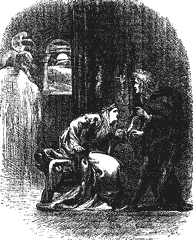![]()
Oedipus or Orestes

| The real basis of Freud's interpretation is his theory that the Oedipus complex is a universal, biological, normal, unavoidable inheritance of the human race. In the very case of Hamlet, it can be demonstrated -- and for the first time in a concrete case analyzed by Freud -- that this theory has to be modified. - Frederic Wertham, "Critique of Freud's Interpretation of Hamlet" in M.D. Faber, The Design Within, Science House, N.Y.. 1970. p.114. |
Wertham then goes on to recount the case history of a patient whose circumstances were similar to Hamlet's in that after his father's death, his mother had an affair with his uncle. The patient "did not restrain himself -- as Hamlet did" and stabbed his mother to death. Wertham, therefore, suggests that the "Orestes complex" provides a more appropriate model for the action in Hamlet. Here's how Wertham describes the "Orestes complex."
| This variety of parent complex which centers on the mother, and more
specifically on hostility toward her, can be designated as the Orestes
complex. Orestes killed his mother Clytemnestra and her lover, his father's kinsman, Aegisthus. The legend of Orestes, which historically marks a turning point in the social position of the mother, has far more similarity to the story of Hamlet than has the story of Oedipus. - Frederic Wertham, "Critique of Freud's Interpretation of Hamlet" in MD Faber, The Design Within, Science House, NY 1970. p.120. |
The Soul of Nero
What wilt thou do? Thou wilt not murder me? (III.iv.21)
One person who entertains the possibility (at least momentarily) that Hamlet might intend to murder his mother is Gertrude herself. The ghost of Hamlet's father has also expressed concern for Gertrude's safety with Hamlet, and to add to the list, Hamlet, himself seems to need some assurance on the matter.
| Now could I drink hot blood, And do such bitter business at the day Would quake to look on: soft, now to my mother - O heart, lose not thy nature, let not ever The soul of Nero enter this firm bosom, Let me be cruel not unnatural. I will speak daggers to her, but use none. - (III.ii.394) |
Freud's assumption is that the presence of Gertrude evokes a sense of guilt and discomfort (as a result of his Oedipal yearnings) which Hamlet is unable to tolerate. Hamlet's own allusion to Nero is based on a similar situation - although derived from quite different events. Nero was reputed to have slept with his mother, Agrippina, and then to have murdered her out of a sense of guilt. Oedipus or Orestes? In both cases, there is an argument to be made that the target of Hamlet's agression would more appropriately have been his mother, rather than his father.